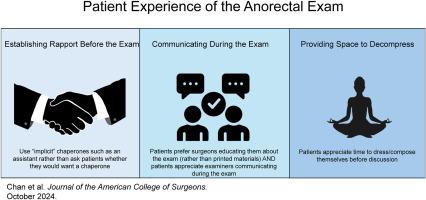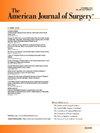“That's what sets you at ease:” A qualitative analysis of patient preferences during anorectal exams
IF 2.7
3区 医学
Q1 SURGERY
引用次数: 0
Abstract
Introduction
Increased attention is being paid to sensitive but necessary medical examinations, but the literature on guidelines for the anorectal exam remains limited. We performed a qualitative investigation of the patient experience to identify best practice recommendations from the patient's perspective for practitioners conducting the anorectal exam.
Methods
We conducted semi-structured interviews with patients aged 18 and older who had received at least one anorectal examination at the University of Chicago Medicine, Colon & Rectal Surgery clinic. The interviews investigated contextual aspects of the anorectal examination, such as the urgency of the visit, the clinical environment, and patients' encounters with the anorectal examination. We sought recommendations on how to improve the examination experience. Interviews were digitally recorded and transcribed. Content analysis was performed by two independent researchers. Interviews were obtained until thematic saturation was reached.
Results
Twenty-three participants (48 % female, 48 % first-time examinees) completed interviews. Regarding examination preparation, most participants preferred obtaining exam information directly from their providers. Without prompting, many female patients expressed a preference for a female provider. Most exam logistics were non-contributory to the patient experience (exam room, gown, instrument use, etc.). Most patients did not mind chaperones if they were additionally serving another role (i.e. assisting in the examination). When chaperones were explicitly offered, every patient declined.
Conclusion
Recommendations included (1) establishing rapport and educating before the examination, (2) building practices to orient patients, (3) explaining procedural steps and eliciting continuous feedback, and (4) implementing routine use of chaperones instead of asking patients to opt-in, when possible. These findings emphasize the need for best practice guidelines and educational interventions to equip healthcare providers for conducting anorectal examinations.

这是一项对患者在肛肠检查时偏好的定性分析
人们越来越重视敏感但必要的医学检查,但关于肛肠检查指南的文献仍然有限。我们对患者的经验进行了定性调查,从患者的角度为从业者进行肛肠检查确定最佳实践建议。方法:我们对在芝加哥大学医学院结肠直肠外科诊所接受过至少一次肛门直肠检查的18岁及以上患者进行半结构化访谈。访谈调查了肛肠检查的背景方面,如就诊的紧迫性、临床环境和患者与肛肠检查的接触。我们就如何改善考试体验征求建议。采访以数字方式记录和转录。内容分析由两名独立研究人员进行。采访一直进行到主题饱和为止。结果23人(女性48%,首次参加考试者48%)完成了面试。关于考试准备,大多数参与者倾向于直接从他们的提供者那里获得考试信息。在没有提示的情况下,许多女性患者表达了对女性医生的偏好。大多数检查后勤对患者体验没有贡献(检查室,长袍,仪器使用等)。大多数患者不介意监护人,如果他们额外服务于另一个角色(即协助检查)。当明确提出要有监护人时,每个病人都拒绝了。结论建议:(1)在检查前建立良好的关系并进行教育;(2)建立指导患者的实践;(3)解释程序步骤并获得持续反馈;(4)在可能的情况下,实施常规使用陪伴者,而不是要求患者选择加入。这些发现强调需要制定最佳实践指南和教育干预措施,以使医疗保健提供者能够进行肛肠检查。
本文章由计算机程序翻译,如有差异,请以英文原文为准。
求助全文
约1分钟内获得全文
求助全文
来源期刊
CiteScore
5.00
自引率
6.70%
发文量
570
审稿时长
56 days
期刊介绍:
The American Journal of Surgery® is a peer-reviewed journal designed for the general surgeon who performs abdominal, cancer, vascular, head and neck, breast, colorectal, and other forms of surgery. AJS is the official journal of 7 major surgical societies* and publishes their official papers as well as independently submitted clinical studies, editorials, reviews, brief reports, correspondence and book reviews.

 求助内容:
求助内容: 应助结果提醒方式:
应助结果提醒方式:


